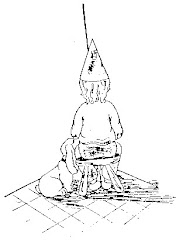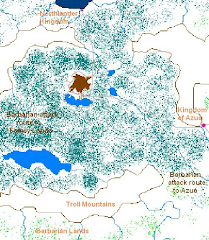I suppose the definition of the
High King's involvement in
The Great Sea depends on one's view of someone who has the power to do anything. Most views of such beings - real or imagined - tend to be prejudiced one way or the other.
Some would hold that, since the
High King has the power to stop all evil but doesn't, the
High King is himself evil. They maintain that a
good being of such power would suppress all evil and keep
The Great Sea at peace. But there is a problem with that which the Evil Viewers
(those who see the High King as evil, not viewers who are evil) refuse to acknowledge. In order to suppress all evil, the
High King (or whoever) would have to suppress
all freedom, because the simple truth is -
everyone tends to evil. The Evil Viewers deny this, but it is true. All beings, creatures and what have you are inclined to act out of selfish motive. Not only that, but what one being, creature or what have you considers evil, another might consider their 'right', and to be denied that right is evil. You see, it comes down to how one defines evil. Let us look at
The Great Sea.
The
High King created
The Great Sea. It was his to give to whomever he chose. He gave it to the
Children of Fire, but with the understanding it was eventually to go to
Madatar and
Ardora. Until
Madatar and
Ardora claimed their gift,
Kensington was to rule and
Draem and
Zenophone were to support him. Fair enough.
But in
Zenophone's mind,
he was far better suited to rule the
Sea than
Kensington. Furthermore, why should the
Sea be given to
Madatar and
Ardora when they had no part in fashioning it? After all, was it not the
Children who did most of the actual work? In
Zenophone's mind, it was evil for him to do all of that work and get nothing in reward. It wasn't fair that
Madatar and
Ardora should be given something for which they had not labored. Evil.
From
Kensington's point of view it did not matter that
Madatar had not been present. The
Sea belonged to the
High King and the
High King was free to give it to whomever he wished. It could be argued that being given the regency may have influenced
Kensington's thinking. Would he have thought the same had
Zenophone been chosen as regent? In any case, from
Kensington's point of view, refusal to abide by the
High King's decision was evil.
But it goes even further than that. The concept of what is evil and what is good filters down into the very basic elements which make up life on the
Sea. The mortal beings who have been given free thought - and thus named
Free People - have dominion over the creatures which live out their existence by instinct. Horses, sheep, cattle and other creatures are forced to serve Men, Dwarfs and Figgits. Is that fair? What is more, some creatures live by feeding upon others. Is
that fair? Some say yes and some say no.
The
High King set the rules by allowing certain things to be and not others. Individual concepts of his goodness - or lack of it - derive from a selfish perspective. The free thinking beings considered actions which supported their wants and desires to be
good, and those which interfered with them
bad. Beasts and other creatures didn't care one way or another. They just lived until they died, and perhaps that is the pivitol point on which good and evil truly separate. There is life, and then there is death. What happens after death? Nothing? Transition? Eternity? What happens?
If, as some claimed, death was the end of whatever/whoever died, then life on
The Great Sea was all important, and whatever happened on
The Great Sea was all important. So to be denied a good life for no apparent reason was evil.
But what if there was more? What if life on
The Great Sea was akin to living in a nursery? What if
dying simply meant
graduation? That changes things a bit, although there are those who would say not by much. But suddenly, life on
The Great Sea becomes a
school. Troubles and blessings, whether one's own or another's, are simply lessons to help prepare for what comes next. If so, then why not just say what comes next? Maybe because what comes next is entirely determined by what takes place? It changes things drastically, at least in the minds of some.
Was the
High King good or bad? Each reader will make up his/her own mind regarding that, and that is as it should be. Some will express their opinion to others, and that is well and good. Others may even seek to persuade others to believe as they do, which is fine. Some will get angry when others disagree with them. That is unfortunate.
In any case, what is the
Author's intent? Well, that would be
me. With regard to
Swords of Fire,
I am the one who has the power to put a stop to anything I choose. Even the
High King cannot act apart from my will. As a writer, I make the determination over what is good, what is bad - and what is simply a matter of perspective. When someone reads what I have written, the story becomes their's, and
they will make these determinations.
For the record, I believe the
High King is good - because he conforms to
my idea of goodness. However, even I must concede that he cannot be wholly good, because my idea of goodness tends to be somewhat fluid, changing as I grow in knowledge and experience. It isn't runny, like pure water. It is more like a thick lava crawling across the ground. It will harden in time, but that is not to say a great upheaval cannot change it.
So it is with me. Many of my beliefs regarding good and bad have
hardened. Not all. New experience still affects my views on many things, and in some things I have completely reversed my thinking over the years. This is especially so in areas involving punishment and forgiveness. I don't see far, but I see further ahead than I did before. My physical eyes continue to weaken, but my
inner eyes, my comprehension, increase, albeit slowly. As I understand better, I can see further ahead - to a point. This is affecting how I view good and bad and punishment and forgiveness. I see myself differently, and so I see others differently. I don't always like what I see in me, but I'm realizing I am so much like everyone else - even if I am so different.
Is the
High King good? Of course he is, silly. He is
me. How can I see him any other way?






